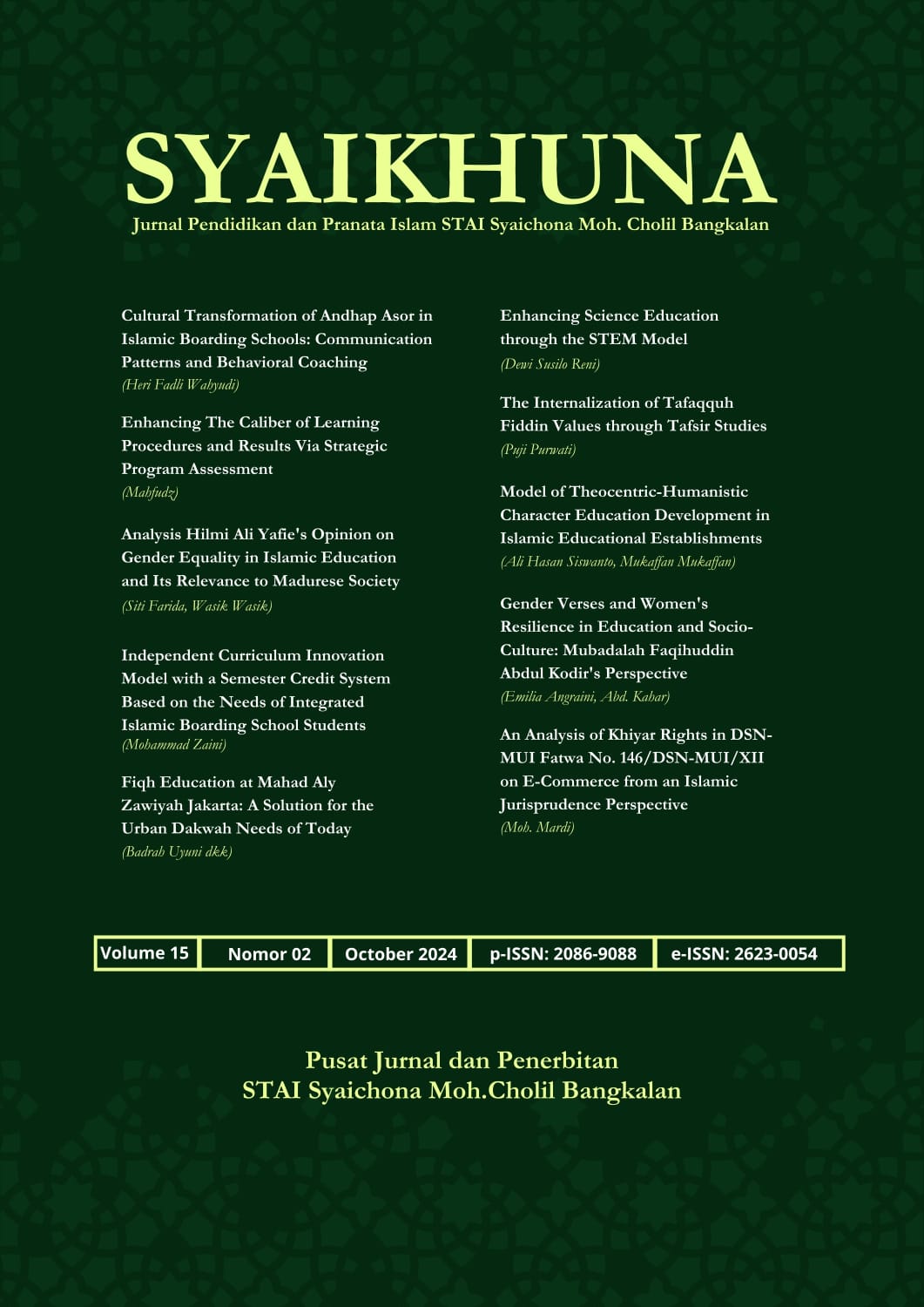Fiqh Education at Mahad Aly Zawiyah Jakarta: A Solution for the Urban Dakwah Needs of Today
DOI:
https://doi.org/10.62730/syaikhuna.v15i02.7497Keywords:
Fiqh Education, Mahad Aly Zawiyah Jakarta, Urban Dakwah, , Islamic Education, Majelis TaklimAbstract
This study investigates the role of Mahad Aly Zawiyah Jakarta in providing a specialized Fiqh education that addresses the unique demands of urban dakwah. With urbanization increasingly shaping the lives of Muslims in city environments, traditional approaches to religious learning often struggle to meet the practical and ethical challenges faced by urban communities. As a result, many urban Muslims may develop a limited or superficial understanding of Islamic principles. Employing a qualitative case study approach, this research gathers data through interviews with educators and students, observations of classroom practices, and analysis of institutional documents to examine the curriculum, teaching methods, and impact of Zawiyah Jakarta’s Fiqh education program. Findings reveal that Zawiyah Jakarta effectively combines traditional Fiqh education with an awareness of modern urban issues, enriching urban dakwah efforts by addressing contemporary challenges. Notable features of Mahad Aly Zawiyah’s curriculum include contextualizing Fiqh teachings specific to urban settings, including ethical decision-making frameworks, and integrating contemporary societal issues, making the program highly relevant for urban Muslims. This study contributes valuable insights into Islamic education by presenting Zawiyah Jakarta’s program as a replicable model that other Islamic educational institutions can adapt. It offers a comprehensive framework for Fiqh education in urban contexts.References
Abdullah, F., Uyuni, B., & Adnan, M. (2023). Tantangan Dan Peluang Pendidikan Quran Di Kota Besar. Spektra: Jurnal ilmu-ilmu sosial, 5(1), 1–17.
Adnan, M., & Uyuni, B. (2021). Maqashid Sharia in Millennial Da’wah. SALAM: Jurnal Sosial dan Budaya Syar-i, 8(5), 1483–1498.
Al-Qardhawi, Y. (1994). Konsepsi Ilmu dalam Persepsi Rasulullah: Kerangka Dasar Metode Pengajaran. Firdaus.
Ambari, M. M. (2023). Konsep Dakwah Ma’had Aly Zawiyah Jakarta Dalam Membina Pemahaman Fiqih Di Kalangan Mahasiswa [Thesis]. Universitas Islam AS-Syafiiyah.
Bagi, K. S. (2019). Masyarakat Urban. Jurnal Theologia, 30(1), 127–152.
Czerka, E., & Pauli, M. M. (2009). Teaching and Learning in Different Cultures: An Adult Education Perspectives. Gdansk Higher School of Humanities Press.
Dinham, A., & Shaw, M. (2017). Religious literacy through religious education: The future of teaching and learning about religion and belief. Religions, 8(7), 119.
Dwiyanti, L. (2021). Implementasi Nilai-Nilai Islam Moderat Pada Mahad Aly Zawiyah Jakarta [Dissertassion]. Universitas Negeri Jakarta.
Glaeser, E. L., & Steinberg, B. M. (t.t.). ). Transforming cities: Does urbanization promote democratic change? Regional Studies, 51(1), 58–68. https://doi.org/10.1080/00343404.2016.1262020
Hamid, A., & Uyuni, B. (2023). Human Needs for Dakwah (The Existence of KODI as the Capital’s Da’wah Organization). TSAQAFAH, 19(1), 1–26.
Hamidah, N. (2022). Membumikan Ilmu Al-Qur’an di Tanah Betawi. Dialektika.
Hamidah, N. (2023). Re-Reading Saifuddin Amsir’s Qur’anic Scholars In Betawi. Al-Risalah: Jurnal Studi Agama dan Pemikiran Islam, 14(2), 537–554.
Hasbiyallah, H., Duran, B. N., & Suhendi, S. (2024). Indonesian Fiqh in higher education: A pathway to moderate and inclusive Islamic values. Jurnal Pendidikan Islam, 10(1), 149-162.
Ismail, A. I., & Uyuni, B. (t.t.). Theology to Technology; The Shift of Facilities Media Da’wa in Millennial Era.
Jati, W. R. (2015). Sufisme Urban di Perkotaan: Konstruksi Keimanan Baru Kelas Menenengah Muslim. Jurnal Kajian & Pengembangan Manajemen Dakwah, 5.
Kohari, K., Adnan, M., Majid, Z. A., & Abdullah, F. (2022). The Role And Function Of The Da’i In The Psychological Perspective Of Dakwah. Al-Risalah: Jurnal Studi Agama Dan Pemikiran Islam, 13(2), 485–498.
Laila, N. Q., & Abdullah, I. (2022). Questioning Fiqh Muamalah of Toleration: Religious spatial segregation in the urban area of Yogyakarta. AL-IHKAM: Jurnal Hukum & Pranata Sosial, 17(1), 28–59.
Lubis, S. A. (2009). Pendidikan Islam dalam Era Perubahan Sosial. Hadharah, Jurnal Ilmu Pengetahuan dan Teknologi Berbasis Islam.
McGarrigle, J. (2015). Islam in urban spaces: The residential incorporation and choices of Muslims in Lisbon. Journal of Ethnic and Migration Studies, 42(3), 437–457. https://doi.org/10.1080/1369183X.2015.1065715
Nurani, S. (2018). Urban Sufism and Transformation of islamic culture in millennial society. Religia, 21(2), 156-169.
Nuryana, Z., & Fauzi, N. A. F. (2020). The Fiqh of disaster: The mitigation of COVID-19 from Islamic education-neuroscience perspective. International Journal of Disaster Risk Reduction, 51, 101848.
Pradana, D. A., Mahfud, M., & Priyanto, H. (2023). Harmonizing Faith and Inclusion: Integrating Religious Values in Inclusive Education. Edukasia, 4(2).
Saefudin, A., & Fitriyah, N. (2020). Peran Guru Ngaji di Era Sustainable Development Goals (SDGs) (Studi Kasus di Desa Semat Tahunan Jepara). Indo-Islamika, 10(2), 93–106.
Said, M. M. T., Umachandran, K., & Don, A. G. (2018). Innovation In Islamic Education. Hayula: Indonesian Journal of Multidisciplinary Islamic Studies, 2(2), 117–128. https://doi.org/10.21009/hayula.002.2.02
Szwec, H. S. (2009). Significance of Critical Model of Educational Work with Adults in Building Intercultural Competence. Dalam Teaching and Learning in Different Cultures: An Adult Education Perspectives (hlm. 13–24). Gdansk Higher School of Humanities Press.
Uyuni, B., & Adnan, M. (2020). The challenge of Islamic education in 21st century. SALAM: Jurnal Sosial dan Budaya Syar-i, 7(12), 1079-1098.
Uyuni, B., & Adnan, M. (2024). Philosophical Foundations in Training Traditional Religious Educators: Bridging Past and Present. Futurity Philosophy, 3(2), 40-65.
Yasin, H. (2019). Ayat-Ayat Akhlak Dalam Al-Quran. Tahdzib Al-Akhlaq: Jurnal Pendidikan Islam, 2(2), 1–15.
Downloads
Published
How to Cite
Issue
Section
License
Copyright (c) 2024 Badrah Uyuni, Mohammad Adnan, Rabiah Al Adawiyah, Fahmi Islam Jiwanto, Sirojuddin Sirojuddin

This work is licensed under a Creative Commons Attribution 4.0 International License.





